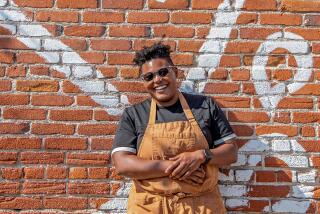NATION’S CAPITAL / LAGGING LUNCHTIME : Tony Restaurants Feel Bite of Downturn in Spending for Meals : A new Administration and a slow economy are among the reasons.
- Share via
WASHINGTON — It’s lunchtime in the nation’s capital, and places like Jean-Pierre--the posh, oh-so-proper restaurant that has long been a favorite of expense-account diners like lawyers and lobbyists--ordinarily are chock-full. Reservations are a must.
But these days, there are plenty of available tables at Jean-Pierre--and at dozens of other top Washington dining-spots--and Jean-Michel Farret, the restaurant’s Gallic, debonair maitre d’hotel, has time to sit and lament his plight.
For a variety of reasons, business has fallen off sharply at Washington’s tonier restaurants over the past several months, and many of them are hurting badly. Receipts at Jean-Pierre alone are down 30% to 40% from their levels of mid-1989.
“It’s the worst in the 20 years that we have been open,” Farret says with a sigh.
In any other city, this downturn might be brushed off as just another business slump, but in Washington it is taken as a sign of something really profound--ranking right up there with the demise of the New Right or the opening up of Eastern Europe.
Restaurants--especially the more-expensive ones--are important to the capital’s essential being. If Napoleon’s army marched on its stomach, Washington’s Establishment rolls on its pastry-carts, government and private analysts agree.
Let history here be your restaurant guide: Before he became President, Sen. John F. Kennedy (D-Mass.) made the Rive Gauche, a Georgetown restaurant, famous. Former Secretary of State Henry A. Kissinger once held court at the Sans Souci--which since has closed.
And during the early and mid-1980s, top aides to then-President Ronald Reagan regularly lunched at the Maison Blanche, which is only a hop-skip-and-a-jump from its English-language namesake at 1600 Pennsylvania Ave. N.W.
But those were the salad days. Today, under President Bush, Washingtonians literally are tightening their belts. Top government officials all but shun higher-priced luncheons. Lobbyists are scaling back. Even the free-spending Japanese are on a diet.
Robert Kinkead, chef-owner at 21 Federal, contends the changeover in the White House is at least partly to blame. During the Reagan years, he says, buying big lunches for people was the in thing to do--like merging with a corporate rival or leveraging an S&L.;
“Certainly since Bush has been in office, there’s been a curtailment of the kind of opulent spending that used to go on during the Reagan years,” Kinkead asserts. “Now people are having to pay the piper for what they were doing back then.”
William Urquiola, a table captain at Ristorante Tiberio along Washington’s business-laden K Street corridor, also cites the Bush Administration’s stepped-up enforcement of a law prohibiting senior officials from accepting lunches from lobbyists and journalists.
A bureaucrat who has to pay for his own meal isn’t likely to want to eat at Tiberio’s, where lunch for two can cost $100 or more, Urquiola explains. Instead, he--or she--is likely to start going to less-expensive restaurants.
The weakened economy here--particularly in Washington’s once-red-hot real-estate business--also plays a part.
Finally, there is a plethora of related reasons--Mayor Marion Barry’s narcotics trial and Washington’s growing reputation (deserved or not) as America’s Murder Capital. “Everything’s tied in,” Kinkead says.
Of course, there is one way the big, expensive restaurants here might regain old customers--by (shudder) lowering prices, something other businesses do routinely when the going gets rough.
But analysts here say that is going to be difficult for Washington’s credit-card establishments to do. After all, reducing prices too obviously can destroy a restaurant’s upscale image. “There’s a big difference between dining and eating--eating is a must; dining is not necessary,” Farret points out.
It also might violate one of Washington’s oldest dictums:
“There is no such thing as a free lunch.”
Times Washington Bureau Chief Jack Nelson contributed to this story.
More to Read
Eat your way across L.A.
Get our weekly Tasting Notes newsletter for reviews, news and more.
You may occasionally receive promotional content from the Los Angeles Times.










